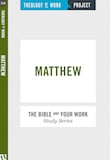Working on the Sabbath (Matthew 12:1-8)
Bible Commentary / Produced by TOW Project.jpg)
Making Time Off Predictable and RequiredRead more here about a new study regarding rhythms of rest and work done at the Boston Consulting Group by two professors from Harvard Business School. It showed that when the assumption that everyone needs to be always available was collectively challenged, not only could individuals take time off, but their work actually benefited. (Harvard Business Review may show an ad and require registration in order to view the article.) Mark Roberts also discusses this topic in his Life for Leaders devotional "Won't Keeping the Sabbath Make Me Less Productive?" |
One of the chief areas of conflict between Jesus and his opponents was in keeping the Sabbath. In this passage, Jesus is criticized by religious leaders for allowing his followers to pluck and eat grain on the Sabbath. The Pharisees regarded this as work, which was forbidden on the Sabbath. Jesus dismisses both their interpretation and their motivation. He argues that plucking just enough grain to satisfy immediate hunger does not break the Sabbath, because both King David and the temple priests did so without incurring God’s rebuke (Matt. 12:3-5). Moreover, true adherence to the Law of Moses should be motivated by compassion and mercy (Matt. 12:6). God’s love of mercy (allowing hungry people to pick grain to eat) is higher than God’s desire for sacrifice (following Sabbath regulations), as had already been revealed in Micah 6:6-8. The gift of a day of rest each week is a promise from God that we do not have to work incessantly just to make ends meet. It is not a judgment against relieving someone’s hunger or need on the Sabbath.
The connection between the Jewish Sabbath and the Christian worship on Sunday, and the application of Jewish Sabbath law to the Christian life are discussed in greater depth in the sections on "Mark 1:21-45" and "Mark 2:23-3:6" in Mark and Work, the sections on "Luke 6:1-11; 3:10-17" in Luke and Work, and in the article Rest and Work at www.theologyofwork.org.











